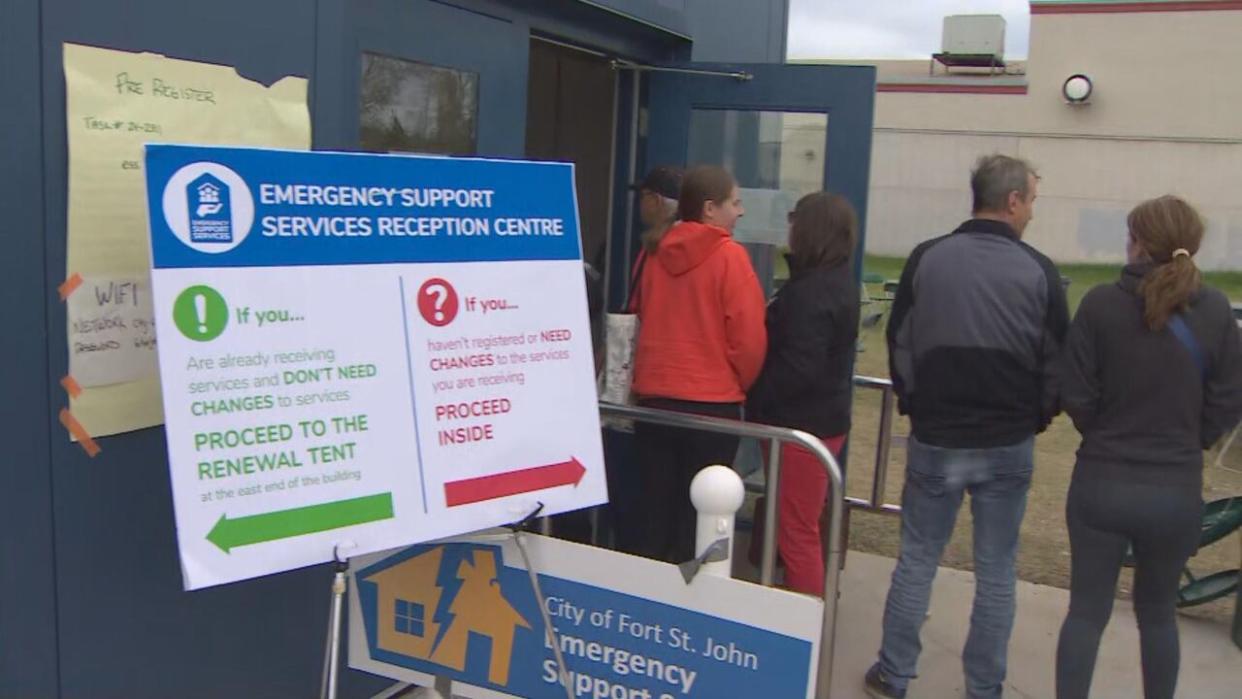Wildfire evacuees can now get financial support via e-transfer

The B.C. government is introducing new measures to make it easier for evacuees to receive financial support during climate disasters.
On Wednesday, Emergency Management Minister Bowinn Ma announced people displaced by wildfires and other disasters will now be able to receive a $200 accommodation allowance, available directly via e-transfer or at emergency reception centres.
"During large-scale evacuations, people are often travelling at late hours of the night and may face long lines at evacuee reception centres before they can receive a referral to a hotel," Ma said in a prepared statement at a Wednesday news conference.
"By increasing the accommodation allowance and giving people the option to receive financial support directly to their bank account, we're empowering people with more options to find suitable accommodation for themselves and their loved ones during times of crisis."
The move comes after more than 4,500 residents of Fort Nelson and the nearby Fort Nelson First Nation were told to leave their homes on the evening of May 10, driving long hours through the night to the community of Fort St. John, hundreds of kilometres away.
Upon arrival, they had to wait at an emergency reception centre in order to receive vouchers for food and hotels.
Some evacuees were told there wasn't suitable accommodation in the community and ended up sleeping in their vehicles before driving further to Dawson Creek or Prince George.
Those who stayed in Fort St. John faced long lines to renew support at the evacuation centre, and several were asked to move hotels in order to make way for pre-existing reservations.
E-transfer support can be accessed after creating a profile at ess.gov.bc.ca. Profiles can be created at any time, and Ma encouraged British Columbians to sign up before a disaster is underway.
Ma also encouraged homeowners and tenants to ensure they have insurance that covers wildfire damage and loss.
Drought in northeast continues to pose risk
Officials have long been worried about a "challenging" wildfire season this year, as a months-long drought persists provincewide and hot, dry conditions are forecast through the summer.
At the same news conference, Forests Minister Bruce Ralston said while rain over the past few weeks has helped lessen the fire risk in some parts of B.C., other regions, particularly the northeast, remain unusually dry and at high risk for wildfires.
Ralston said there are currently 108 active wildfires burning across the province, the majority of which are in the Prince George Fire Centre, covering the northeast of the province, which "has experienced an early and intense start."
Adding to the challenge are 73 holdover fires — which were dormant through the winter but reignited thanks to the dry conditions — B.C. Wildfire Service forecaster Matt MacDonald said.
WATCH | How holdover wildfires are affecting B.C.:
MacDonald said the combined perimeter of all of the province's holdover wildfires is 7,839 kilometres, around the same distance between Vancouver and Paris.
Many of these holdover fires, he said, were burning deep into the ground in tree root systems, making it difficult for them to be extinguished.
So far, he said, just 15 of 88 holdover fires detected this year have been put out.
In good news, he said, the amount of human-caused wildfires is well below normal and lightning activity — the leading cause of wildfires in B.C. — has remained relatively low.
But he warned there is currently no expectation that the rainfall forecast for the summer will be enough to alleviate the extreme drought conditions seen outside of coastal B.C., particularly in the northeast.
Ralston said the province is ready to tackle the new wildfire season "head on" after learning lessons from 2023, which is widely regarded as the worst on record.
The B.C. Wildfire Service has been preparing for the likelihood of another tough season by employing new aircraft and other equipment, recruiting more firefighters, and focusing on wildfire prevention through prescribed burns and educating property owners about how to better protect their homes.

 Yahoo News
Yahoo News 
